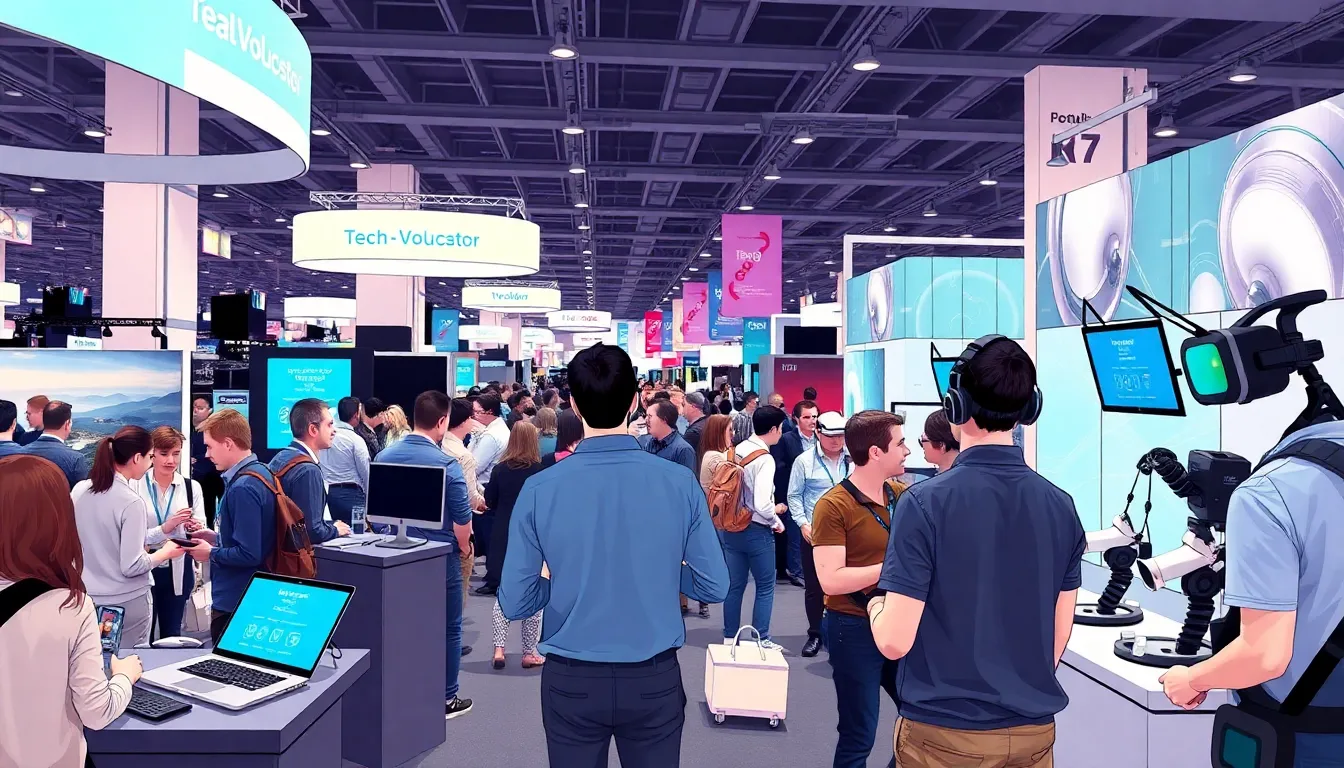In a world where technology evolves faster than a toddler can throw a tantrum, the race for the title of “best technology” is fiercer than ever. From sleek smartphones that practically run our lives to AI that can predict what you’ll want for dinner, it’s no wonder everyone wants to know who’s leading the pack. Is it the tech giants in Silicon Valley, the innovative minds in South Korea, or perhaps the up-and-coming startups in China?
As nations battle it out with gadgets and gizmos, the question remains: who truly has the best technology? This article dives into the thrilling showdown of innovation, creativity, and downright coolness. Buckle up as we explore the tech titans and their groundbreaking inventions that are shaping our future and making life just a little bit more interesting.
Table of Contents
ToggleOverview of Global Technology Leaders
Various nations and companies vie for supremacy in the technology sector, each contributing unique advancements. The United States stands out with Silicon Valley, home to key players such as Apple, Google, and Microsoft. These companies lead in areas like software development, cloud computing, and consumer electronics.
In East Asia, South Korea has made significant strides in technology, driven by firms like Samsung and LG. Innovations in smartphone production and display technologies position South Korea as a formidable competitor on the global stage.
China’s landscape features a rapidly growing ecosystem of tech startups and established giants like Huawei and Tencent. These companies excel in artificial intelligence, telecommunications, and e-commerce, showcasing China’s capability to disrupt traditional tech paradigms.
Europe represents another critical player, with companies like Siemens and SAP paving the way in automation and enterprise software. Investments in sustainability and green technology are particularly noteworthy among European firms striving for leadership in eco-friendly innovation.
Emerging markets contribute to the global tech arena as well. Nations like India foster tech hubs that produce cutting-edge solutions in software and IT services. Startups in cities like Bangalore and Hyderabad drive advancements, attracting global attention.
Global competition fosters innovation, making the landscape dynamic and ever-changing. Leaders continually adapt to technological trends, influencing not just markets but also everyday life.
The United States: A Hub of Innovation

The United States plays a pivotal role in the global technology landscape. Innovation thrives here, driven by leading companies and dedicated research efforts.
Major Tech Companies
Major players dominate the U.S. tech scene, including Apple, Google, and Microsoft. These companies lead in software development and consumer electronics, continually launching groundbreaking products. Improvements in artificial intelligence, cloud computing, and digital services reflect their unwavering commitment to progress. These innovations frequently set the standard for the global market, influencing millions of users. Competitive pressure sparks rapid advancements, pushing these firms to enhance their offerings consistently.
Cutting-Edge Research and Development
Cutting-edge research and development define the tech industry’s growth within the U.S. Institutions such as MIT and Stanford contribute significantly to technological breakthroughs. Collaborative efforts between universities and private companies accelerate progress in various fields, from robotics to biotechnology. Investments in R&D surpass $500 billion annually, fueling innovation and attracting talent worldwide. Focused initiatives in AI, cybersecurity, and renewable energy highlight the country’s commitment to forward-thinking solutions. These advancements shape not only the U.S. market but also have lasting effects on a global scale.
China: Rising Technological Power
China has rapidly emerged as a significant global player in technology. The nation’s investments and innovations attract worldwide attention.
Advancements in Artificial Intelligence
China leads in artificial intelligence (AI) development, leveraging vast data and government support. With algorithms and machine learning models, Chinese companies enhance various sectors, including healthcare and finance. Organizations like Baidu and Alibaba invest heavily in AI research, creating cutting-edge applications for urban management and customer service. Investments in AI research and development are projected to reach approximately $150 billion by 2025. The focus on AI positions China as a formidable competitor against leaders like the United States.
Infrastructure and 5G Technology
Infrastructure underpins China’s technological rise, especially in telecommunications. With extensive investment in 5G technology, the country has become a front-runner in mobile connectivity. By deploying over 1.4 million 5G base stations nationwide, China establishes a framework enabling faster internet speeds and improved connectivity. Companies such as Huawei play a crucial role in this expansion, providing equipment and expertise. The fast-paced rollout of 5G enhances industries from smart cities to autonomous vehicles, emphasizing China’s commitment to integrating advanced technologies into everyday life.
Europe: Balancing Tradition and Innovation
Europe stands at the intersection of tradition and modernization in technology. The continent is home to several leading countries that are pushing the boundaries of innovation while remaining rooted in established practices.
Leading Countries in Tech
Germany leads in engineering and manufacturing technologies, with companies like Siemens revolutionizing automation and smart infrastructure. France follows closely, emphasizing advancements in cybersecurity through firms like Thales. The United Kingdom excels in fintech, driven by startups and traditional banks adapting to digital transformations. Sweden, known for its commitment to technology and sustainability, houses Spotify and Ericsson, both of which innovate in music streaming and telecommunications. Denmark’s focus on IT solutions and renewable energy sources positions it as a rising force in clean technologies. Collectively, these countries contribute significantly to European technological prowess.
Sustainable Technologies and Innovations
Sustainability remains a core principle in Europe’s technological landscape. Wind energy leads the region’s renewable sector, with Denmark producing over 47% of its energy from wind in 2020. Germany invests in solar technologies, focusing on reducing carbon footprints while enhancing efficiency. Notably, the European Union’s Green Deal aims for carbon neutrality by 2050, fostering investments in green technologies. The continent also champions the circular economy, promoting recycling and reuse of materials in various industries. Innovative projects like smart grids and energy-efficient buildings showcase Europe’s commitment to sustainable innovation, leading to practical applications in everyday life.
Japan: Pioneers in Robotics and Electronics
Japan stands out as a global leader in technology, excelling in robotics and consumer electronics. The nation’s dedication to innovation has established it as a powerhouse in these fields.
Robotics Breakthroughs
Robotics in Japan continues to evolve at an impressive pace. The country’s commitment to automation leads to remarkable advancements in humanoid robots and industrial automation systems. Companies like Honda and SoftBank have developed robots such as ASIMO and Pepper, which exhibit sophisticated artificial intelligence capabilities. These machines perform tasks ranging from caregiving to customer service. Furthermore, Japan invests heavily in robotics research, with government initiatives supporting projects that increase efficiency in industries like manufacturing and logistics. Not only do these innovations enhance productivity, but they also redefine human-robot interaction, making technology more accessible to everyday users.
Consumer Electronics Leadership
Japan’s prowess in consumer electronics reflects its focus on quality and innovation. Leading companies like Sony, Panasonic, and Toshiba consistently introduce cutting-edge products that set industry benchmarks. The latest advancements include high-definition televisions, advanced sound systems, and versatile home appliances. For instance, Sony’s Bravia TVs incorporate OLED technology, delivering stunning picture quality. Additionally, Japan emphasizes user-friendly design, integrating smart technologies into everyday devices. The country contributes significantly to the global market with its robust R&D investment and commitment to sustainability in electronics. This prioritization of quality and innovation positions Japan as a premier destination for consumers seeking the best technology.
The quest for the best technology in the world is a dynamic and multifaceted journey. As nations and companies vie for leadership, innovation continues to flourish across various sectors. The United States remains a powerhouse with its Silicon Valley giants driving advancements in software and consumer electronics. Meanwhile, China’s rapid rise in AI and telecommunications showcases its determination to compete on a global scale.
Europe’s focus on sustainability and automation, along with Japan’s expertise in robotics and consumer electronics, adds further depth to the tech landscape. Each region contributes uniquely to the ongoing evolution of technology, ensuring that the competition fuels progress and enhances everyday life. As this landscape evolves, the definition of “best technology” will undoubtedly continue to change, reflecting the remarkable advancements shaping the future.










